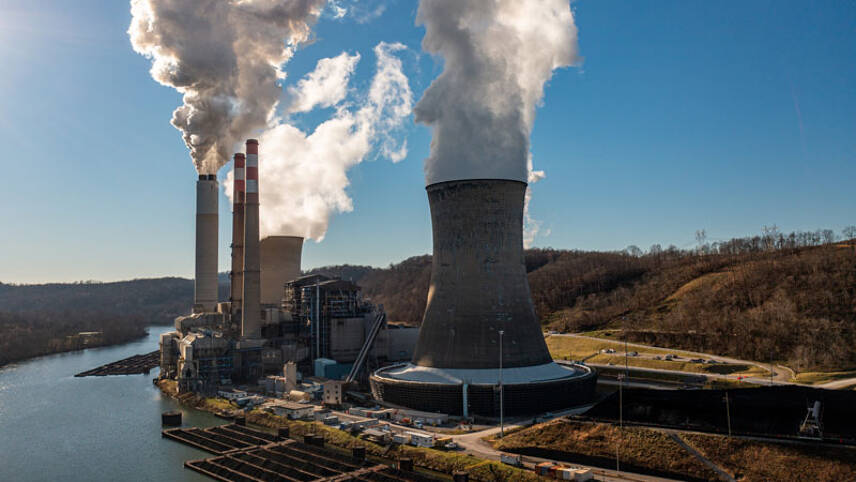Register for free and continue reading
Join our growing army of changemakers and get unlimited access to our premium content

Pictured: The Fort Martin coal-fired power station in West Virginia
The assessment has been published today (15 November) by CDP and the World Benchmarking Alliance. It looks at the energy transition plans of 68 companies across Europe, Africa, Asia, North America, Latin America and the Middle East.
Promisingly, several of these firms have significantly expanded their renewable energy generation in recent years. Their collective generation share attributable to wind and solar exceeded 7% in 2022, up from around 3.5% in 2017. If this exponential trajectory is maintained, their renewable generation share could hit 49% by 2030.
But the report also unveils how many of these companies are failing to invest in – and plan for – the energy transition.
Less than half of the assessed businesses are investing in energy storage capacity, and only three in ten have either shared or standalone plans to grow their energy storage capacity. This is despite how important it is to invest in energy storage to maintain security of supply as renewable energy generation scales up.
Additionally, 60 of the 68 firms generated power using coal over the past five years and, while two-thirds of these companies have reduced their reliance on coal, most are not planning to exit the coal space. 57% of them have no plans to phase out coal generation.
The only two assessed companies to have already ended coal generation are SSE and Iberdrola.
This means that the development of all new coal mines and coal mine extensions should halt as soon as possible – as should the creation of any new coal-fired power plants without strong efficiency measures and carbon capture.
Beyond looking at coal, the assessment found that few electric utilities are drawing up and disclosing science-based plans to cut their emissions. 85% of the companies included in the benchmark have net-zero targets and delivery plans which are aligned to the IEA’s roadmap.
All of those with aligned plans are based out of Europe.
A moment for accountability?
The World Benchmarking Alliance’s transformation lead for decarbonisation and energy Vicky Sins said: “We cannot keep 1.5C alive without the electric utilities sector moving more quickly away from polluting fossil fuels to renewable energy.
“These companies have a huge opportunity to lead the way. But despite promising progress, too few companies are investing in technologies and building the grid flexibility needed to ramp up renewables and retire fossil fuels.”
“COP28 is our opportunity to hold the electric utilities sector accountable for a faster energy transition. Companies around the world who make and distribute electricity must seize the unprecedented opportunity to make our systems better and cleaner, and to ensure their operations are fit for the future.”
COP28, this year’s edition of the UN’s annual global climate summit, is set to begin in Dubai on 30 November. The Presidency in the United Arab Emirates (UAE) will advocate for nations to adopt an ambition to treble global renewable energy capacity this decade – a vision already supported by the G20.
Concerns remain, however, about whether the final agreement will include weak language on fossil fuels. This will be the second COP in a row hosted in a major oil and gas exporter and the UAE is, reportedly, involving its state-owned oil company. It has also paved the way for OPEC to have a more significant voice.
At COP27 in Egypt last year, the UAE and other oil and gas exporters pushed for a final text that committed nations to ‘phase down’ fossil fuels and reform ‘inefficient’ fossil fuel subsidies. Some nations had been hoping for a ‘phase out’ and for all subsidies to be tackled.
There was also wrangling last time around about whether nations reliant on fossil fuels should be able to use carbon capture as an alternative to transitioning their energy generation. UN Secretary-General Antonio Guterres has strongly cautioned against this rhetoric, which nonetheless seems to have swayed the UK’s COP28 delegation and will doubtless be on display again this year.
International law firm Womble Bond Dickinson has this week published the results of a survey of 456 decision-makers in the energy industry, confirming that most are looking to national governments for clearer and more long-term support for the energy transition.
More than half (56%) said rising costs and unfavourable economic conditions were the top challenges facing the clean energy transition. This concern was felt in developed and wealthy economies alike.
A similar portion said they are concerned that governments are not placing enough strategic focus on grid infrastructure and energy flexibility.


Please login or Register to leave a comment.